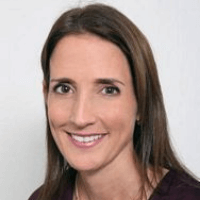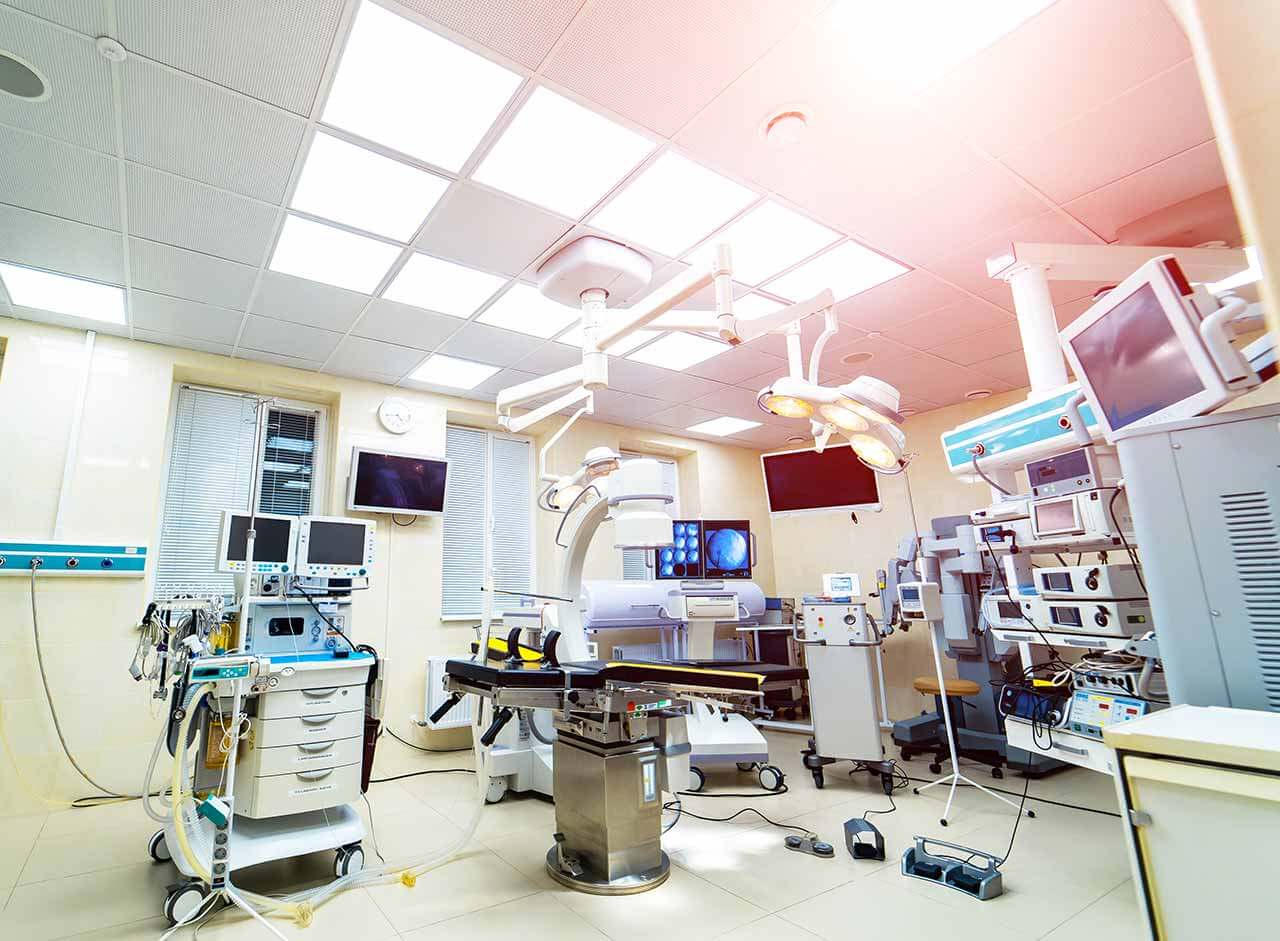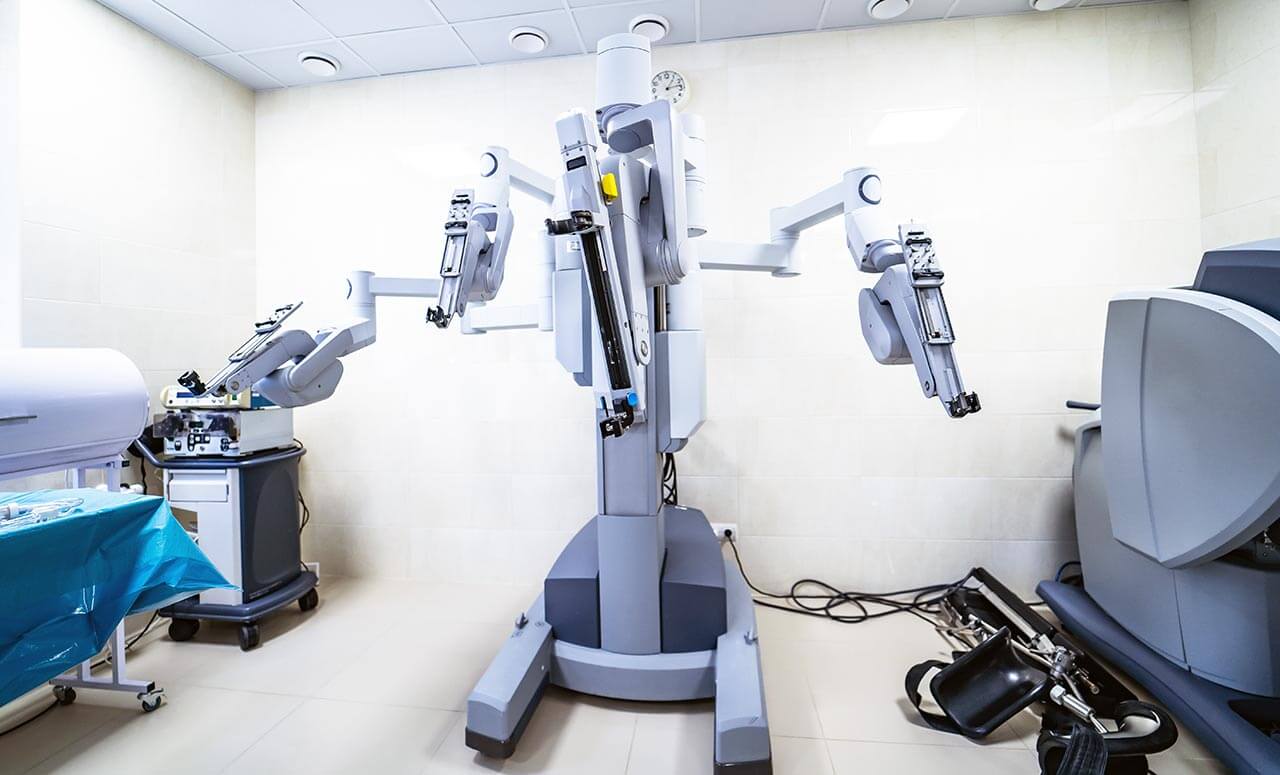
The program includes:
- Initial presentation in the clinic
- clinical history taking
- review of medical records
- physical examination
- laboratory tests:
- complete blood count
- general urine analysis
- biochemical analysis of blood
- inflammation indicators (CRP, ESR)
- indicators of blood coagulation
- tumor markers (CEA, CA19-9, CA125)
- CT planning of radiation therapy
- full course of conventional radiation therapy or brachytherapy
- chemotherapy (6 cycles), the cost of medicines is included
- symptomatic treatment
- cost of essential medicines and materials
- nursing services
- control examinations
- consultations of related specialists
How program is carried out
During the first visit, the doctor will conduct a clinical examination and go through the results of previous laboratory tests and instrumental examinations. After that, you will undergo an additional examination, including complete blood count, laboratory assessment of liver and kidney function. Based on the received results, the physician will elaborate the chemotherapy regimen, conduct radiotherapy planning with the help of CT or MRI, make the permanent tattoo marks on the skin and conduct CT simulation in order to assess the accuracy of the rays and the radiation dose. If necessary, related medical specialists will be involved in the elaboration of a treatment regimen (tumor board).
Chemotherapy and radiation therapy are carried out as the day hospital procedure, without mandatory admission to the hospital. At each visit, the physician will assess your general condition and the marks on the skin. After that, you will be placed in a shielded radiation therapy room, on a special table.
Each radiation therapy session lasts less than half an hour (including preparation). All this time, doctors and nurses are monitoring your condition, you can communicate with them through a loudspeaker. The procedure is completely painless. Depending on the planned course of treatment, you will visit the hospital from 1 to 3-5 times a week.
During the chemotherapy session, after the placement of a venous catheter, you will stay in a comfortable ward. An infusion system will be connected to the catheter, through which the required drug or a drug combination will be administered. All drugs are administered by intravenous drip, slowly, so the total duration of the infusion can be up to several hours. All this time, doctors and nurses will monitor your health condition closely.
After the completion of the chemotherapy and radiation therapy course, you will undergo control examinations aimed at assessing your condition and efficacy of treatment. After that you will receive the medical report with detailed recommendations regarding further follow-up and treatment. In the future, you will be able to have a distant consultation with your attending physician and schedule the next course of treatment, if necessary.
Required documents
- Medical records
- MRI/CT scan (not older than 3 months)
- Biopsy results (if available)
Service
You may also book:
 BookingHealth Price from:
BookingHealth Price from:
About the department
The Department of Oncology at the Rambam Health Care Campus Haifa provides the comprehensive diagnostics and treatment of malignant diseases of various organs and anatomical structures at the highest level of modern medicine. The department's experienced oncologists offer innovative treatment regimens using chemotherapy and radiation therapy. Of particular interest is also the effective palliative care aimed at improving the quality of life of patients with the advanced stages of cancer. The department is certified by the European Society for Medical Oncology (ESMO) and is one of the leading specialized Israeli departments. The department is headed by Prof. Dr. med. Irit Ben Aharon.
The key to successful cancer treatment is early diagnostics. All examinations are carried out using state-of-the-art equipment, according to strict and current protocols. The standard diagnostic services include biopsy, endoscopic procedures, imaging examinations (X-ray, computed tomography, magnetic resonance imaging, ultrasound examinations) and tumor marker tests. The diagnostic results are the basis for the selection of optimal treatment regimen taking into account individual clinical indicators and patient's needs.
The treatment can be carried out both on an inpatient and outpatient basis. The department cooperates closely with the US and European Cancer Research Centers, which allows the doctors to implement the high-performance cancer treatment technologies, such as intraoperative radiation and brachytherapy, chemotherapy, radiosurgery, immunotherapy, targeted and hormone therapy into everyday practice. The new developments change the modern understanding of the prognosis for patients suffering from advanced, recurrent and inoperable types of cancer.
The department offers the participation in clinical trials of new drugs or treatment methods for some patients. Such an alternative approach can often save or significantly prolong the life of a patient with advanced cancer.
The diagnosis of cancer is not an easy experience for a person. In this regard, the department also provide patients with psychological care. A confidential conversation with the doctor about all possible treatment options, including clinical trials, also helps the patients to think positively and believe in a successful treatment outcome.
The department specializes in the diagnostics and treatment of the following oncological pathologies:
- Head and neck tumors
- Laryngeal cancer
- Tongue cancer
- Salivary gland cancer
- Oral cancer
- Eye tumors
- Tracheal cancer
- Thyroid cancer
- Thymoma
- Tonsil cancer
- Tumors of the nervous system (neuro-oncology)
- Brain tumors
- Spinal tumors
- Breast tumors
- Breast cancer
- Paget's disease
- Tumors of the female reproductive system
- Cervical cancer
- Ovarian cancer
- Uterine cancer
- Vulvar cancer
- Endometrial cancer
- Tumors of the genitourinary system and male reproductive organs
- Prostate cancer
- Bladder cancer
- Testicular cancer
- Kidney cancer
- Adrenal cancer
- Gastrointestinal tumors
- Esophageal cancer
- Colon cancer
- Rectal cancer
- Stomach cancer
- Pancreatic cancer
- Gallbladder cancer
- Tumors of other organs
- Blood cancer
- Mediastinal tumors
- Lung cancer
- Skin cancer (melanoma, basal cell carcinoma)
- Soft tissue cancer (sarcomas)
- Bone cancer
- Lymph node cancer
- Other malignancies
The therapeutic service range of the department includes:
- Surgical treatment
- Stereotactic radiosurgery
- Radiosurgery (LINAC progressive linear accelerator)
- Chemotherapy
- Radiation therapy
- Targeted therapy (drug treatment for cancer, which directly affects cancer cells without harming healthy tissues)
- Immunotherapy (affects the patient's immune system, thereby stimulating it to cope with a malignant process)
- Hyperthermia
- Bone marrow transplantation
- Photodynamic therapy
- Laser therapy
- Hyperthermic intraperitoneal chemotherapy (HIPEC)
- Blood transfusion
- Other treatment methods
Curriculum vitae
For more than 10 years, Prof. Irit Ben Aharon has been saving the lives of cancer patients. In addition to medical practice, she is actively engaged in research activities aimed at developing new, more effective and safer treatment methods for gastrointestinal cancer, especially in young patients. The antitumor treatment used today often causes pronounced side effects, such as loss of fertility. One of the main scientific purposes of the professor is to maintain the ability to bear children in cancer patients.
Prof. Irit Ben Aharon is the head of several researches. In addition, she studies the side effects of chemotherapy drugs in conjunction with other Israeli and American scientists. The professor was one of the co-authors of a scientific breakthrough – cryopreservation of eggs before chemotherapy in patients under the age of 18 years.
Prof. Ben Aharon received several prestigious awards for her active scientific work. She also repeatedly won research grants from the Israeli and foreign funds. Nowadays, the professor gives lectures at the Faculty of Medicine of the Tel Aviv University.
Prof. Irit Ben Aharon graduated from the Faculty of Medicine at the Tel Aviv University in Israel. She received Doctoral Degree in embryogenesis and fertility there. The internship took place at the Davidoff Cancer Centre in the city of Petah Tikva in Israel. This was followed by compulsory foreign practice in embryogenesis and fertility at the National Institute of Health in the USA, in the field of oncofertility at the Dana-Farber Cancer Institute in Boston, USA, as well as in the treatment of gastrointestinal cancer at the Memorial Sloan Kettering Cancer Center in New York, USA.
Dr. Irit Ben Aharon is a Member of the Israeli Society for Clinical Oncology and Radiation Therapy, the American Society of Clinical Oncology, the American Association for Cancer Research and the European Society for Medical Oncology.
Photo of the doctor: (c) Rambam Health Care Campus Haifa
About hospital
The Rambam Health Care Campus Haifa is the largest and the most progressive hospital in Northern Israel. The medical center was founded in 1938 and nowadays is proud of its long history, rich and successful experience in providing comprehensive medical services in all medical fields. The hospital serves more than 2 million locals, as well as the members of the Israel Defense Forces, UN Peacekeeping Forces and the United States Sixth Fleet. The medical center houses 61 inpatient departments, 73 specialized departments, 10 medical institutes and 25 laboratories. It is also the clinical and academic base of the Technion – Israel Institute of Technology.
The medical center includes the Ruth Rappaport Children's Hospital. It is a multidisciplinary medical facility specializing in the diagnostics and treatment of various pathologies, including extremely rare ones, in children of all age groups.
The total number of employees in the medical facility is 4,000 (715 doctors and 1,407 nurses). Many doctors are world-famous in the field of their clinical specialty and participate in advanced research projects in order to offer new treatment methods not only to their patients, but also to the world community.
The medical center is a leader in the field of medical care in emergency cases with a large number of victims. In addition, the hospital is certified in accordance with the strict standards of the Joint Commission International (JCI).
During the long-term and successful clinical practice, the medical center has formed a clear vision of optimal medical support and system of values. These suggest that the primary focus is always on the patient with his individual needs and wishes, while the medical services are professional, high-quality and safe. In addition, the specialists of the hospital apply the most effective and innovative treatment methods, as well as create a favorable environment, which contributes to the improvement of physical and emotional health and well-being of the patient. The key role in the daily work of the hospital is also played by a tolerant attitude towards all patients.
Photo: (c) depositphotos
Accommodation in hospital
Patients rooms
The patients of the Rambam Health Care Campus Haifa live in comfortable rooms designed in light colors. The standard room includes an automatically adjustable bed, a bedside table, a wardrobe for storing clothes, an armchair and chairs for receiving visitors, a TV, a telephone. Each room is equipped with an ensuite bathroom with shower and toilet.
Meals and Menus
The patients of the hospital are offered tasty and balanced three meals a day: breakfast, lunch and dinner. The menu also includes dietary and vegetarian dishes.
Further details
Standard rooms include:





